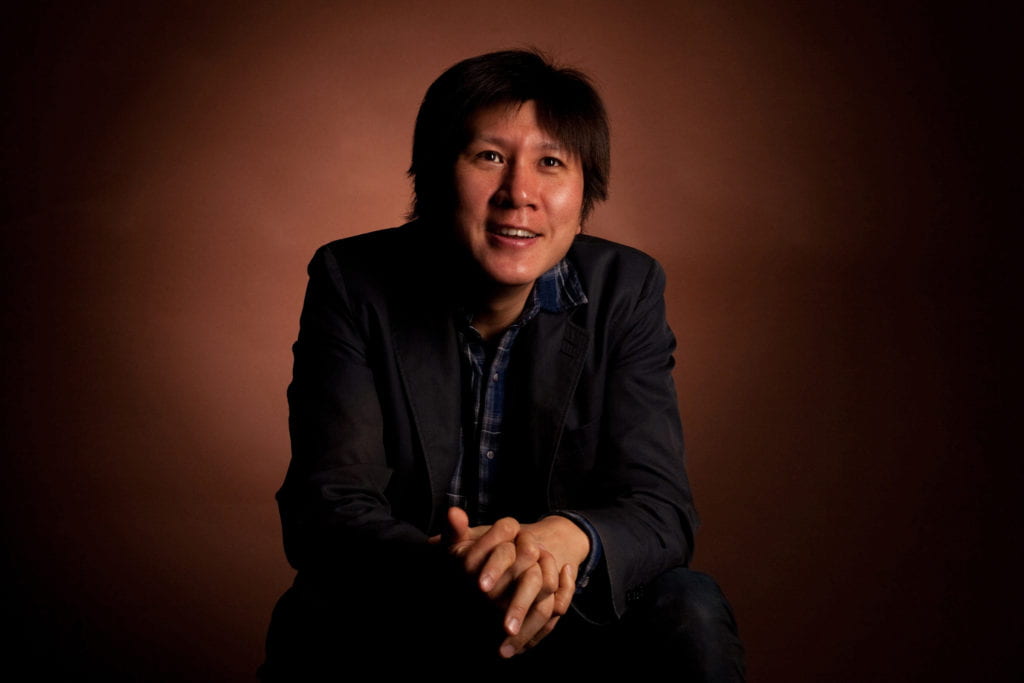Spotlighting South Korean cinema
UCI professor who studies the films of his homeland finds a fan in Martin Scorsese.
Kyung Hyun Kim spent his childhood in Indonesia and the Middle East due to the career demands of his father, a petroleum engineer for a South Korean oil company. He turned to movies at an early age to escape the stress of frequent moves and new schools.
“I think because of their unfamiliarity with American culture, my parents let me watch a lot of movies that weren’t made for children,” says Kim, a UC Irvine associate professor of East Asian languages & literatures and film & media studies. “‘Kramer vs. Kramer’ and ‘The Big Chill’ were really inspiring. I think I was 10 when I watched them, and they were awesome.”
This glimpse into American culture proved useful when Kim’s parents enrolled him in a Massachusetts boarding school when he was 15. Kim went on to major in politics and East Asian studies at Oberlin College in Ohio and earned his doctorate in critical studies at the University of Southern California’s School of Cinematic Arts. He joined the UCI faculty in 1998.
As a scholar, Kim turned a critical eye to the films of his homeland. His new book, Virtual Hallyu, chronicles the rise in popularity of South Korean cinema in the early 21st century. Movies such as “The Host,” about an aquatic monster that emerges from the Han River, and “Oldboy,” the tale of a white-collar worker turned vengeful fighting machine, were critical and commercial hits and illustrative of this “new wave” in Korean films.
“Typhoon,” about a modern-day pirate who hijacks a freight ship carrying sensitive cargo, and “A Bittersweet Life,” a film noir involving Korean organized crime figures, were huge hits in Japan and outperformed their Hollywood competitors at the Korean box office.
While most U.S. moviegoers are unaware of the Korean resurgence, these films have a high-profile devotee in Academy Award-winning American director Martin Scorsese.
Kim scored a major career coup when Scorsese agreed to write the foreword to his book. In it, the director says Kim “knows that vital works of art never sit easily within the society they come out of. He enlarges our vision of one of the great national cinematic flowerings of the last decade.”
The two met through mutual friend Vera Farmiga, an actress who appeared in Scorsese’s “The Departed” and in “Never Forever,” a film co-produced by Kim. They quickly bonded over their love of movies.
“He invited me to have lunch with him at his home in New York’s Upper East Side in the fall of 2006,” says Kim, who also directs UCI’s critical theory emphasis. “Our friendship began then, as I noticed that he was really a gregarious Sicilian kid at heart.”
“Our taste in films actually overlaps quite a bit,” he adds, “so it was very easy to talk to him. It was hard to resist my urge to do impressions of Joe Pesci in ‘Goodfellas’ and Robert DeNiro in ‘Taxi Driver.’”
He recommended a South Korean horror classic from 1960, “The Housemaid.” Scorsese loved the movie – a revenge story mixed with elements of humor and fright – but was appalled at its condition. The director used his influence with the World Cinema Foundation to restore and digitize the film in 2008.
Kim often suggests other must-see Korean movies to Scorsese. Some of his favorites from the last decade are:
“The Servant” (2010): a retelling of the popular Korean folktale “Chunhyangjeon,” in which a courtesan’s daughter falls in love with the son of a local magistrate. Director Kim Dae-woo cleverly tweaks this classic by asking: What if the courtesan’s daughter falls in love with the aristocrat’s servant? The wit and innuendo in the script is reminiscent of William Shakespeare’s plays, Kim says.
“Painted Fire” (2002): a period piece about Jang Seung-up, a self-taught painter during the repressive Yi dynasty who must convince others that a commoner can possess artistic talent. It parallels the life of its director, Im Kwon-taek, a filmmaker with a working-class background and no formal training.
“Oldboy” (2003): a revenge fantasy featuring beautifully choreographed fight scenes that won numerous international awards, including the Cannes Film Festival’s Grand Prix. The movie examines Korean urbanization and class tensions, interwoven with such disturbing themes as incest.
“Secret Sunshine” (2007): a drama in which a widowed mother relocates to the countryside for a new start. Tragedy strikes again when her son is killed, so she turns to Christianity to cope with her trauma. The movie explores faith, love and forgiveness and shows that South Korean – as well as European – filmmakers are capable of tackling existential questions.
What’s next for Kim? He’s working on a mystery novel that he plans to adapt for the big screen and organizing a fall 2012 conference – funded by the Academy of Korean Studies – on South Korean art, film and popular culture of the last 40 years. Kim also maintains a blog devoted to these topics, conducts research and, of course, teaches.
He looks forward to developing more movie projects in the future. His last effort, “Never Forever,” was a hit at the 2007 Sundance Film Festival and garnered the Jury Prize at the 2007 Deauville American Film Festival in France.
It didn’t break any box office records in the U.S., Kim says, but is a popular rental on Netflix. The movie’s theatrical run in South Korea, however, was a bit of a disappointment.
“It opened the same week as ‘Transformers,’” he says. “We got smashed.”

